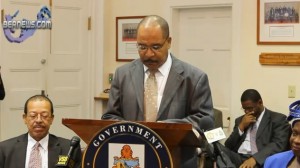Minister Blakeney: Human Rights Reforms
 Legislation is being tabled in the House of Assemby today [Dec.2] to bring the Bermuda Human Rights Commission into line with international standards, Youth, Families & Sports Minister Glenn Blakeney [pictured] has said.
Legislation is being tabled in the House of Assemby today [Dec.2] to bring the Bermuda Human Rights Commission into line with international standards, Youth, Families & Sports Minister Glenn Blakeney [pictured] has said.
Working in conjunction with the Department of Human Affairs, the Minister will introduce The Human Rights Amendment [No.2] Act 2011 to not only reform the HRC but to ensure Bermuda also conforms to global best practice when protecting and promoting human rights.
Earlier this summer, the Ministry of Youth, Families and Sports undertook major structural reform of the Human Rights Commission [HRC] based on a significant number of recommendations, jurisdictional reviews and extensive research as part of the government’s phased approach to bring reform to the Human Rights Act 1981. Today those amendments are being tabled in the House of Assembly. The Minister explained that in 2010, the staff and the functions of the Commission for Unity and Racial Equality [CURE] were transferred to the HRC with the belief that the HRC was best suited to oversee the investigation and conciliation of cases of racial discrimination.
This amalgamation provided the basis for an extensive internal review of the Human Rights Commission’s processes and procedures. Research was conducted including a jurisdictional analysis into the types of human rights institutions in a number of Commonwealth countries including the UK, Canada, Australia, New Zealand and the Caribbean. The hybrid model was identified as the most applicable for Bermuda.
Further impetus for the review of the Commission’s structure were prompted by decisions from the Courts and reviews by the Ombudsman’s Office. Both have long commented on the need for change to the Human Rights Act and for it to measure up to other human rights legislation from around the world.
The amendments contained in the amendment being tabled in the House of Assembly today are based on the determination that three key requirements had to be met. First, that knowledgeable and competent decisions, able to withstand scrutiny, are made throughout the process of addressing a human rights complaint; second, that the complaint process is clear to the public; and thirdly, that all cases progress in a timely manner.
Currently, the Human Rights Commission screens complaints, conducts investigations and seeks to conciliate or settle complaints of unlawful discrimination, said a Government spokesman. The commission does not adjudicate a complaint and when the Commission is unable to settle a complaint it is forwarded to the Minister for referral to a Board of Inquiry for a hearing. The progression of cases through the Human Rights Commission to the Minister and then on to a Board of Inquiry is extremely lengthy, circuitous and confusing to the parties.
“The objective of the 2011 Amendment Act is therefore to completely restructure the process from the intake of a complaint through to the hearing of the complaint,” said the Government spokesman. “It will transfer the screening functions of the Commissioners to the Executive Officer and the Investigations team at the Human Rights Office who are trained to carry out that role and it will also convert the Commissioners’ role to that of a Human Rights Tribunal.
“Boards of Inquiry, as they currently exist, will be replaced by the Human Rights Tribunal each one comprised of a small number of Commissioners who will hear cases and render decisions. Therefore, the primary function of Commissioners will become the adjudication of cases and the Minister will be removed completely from this process.
The replacement of a Board of Inquiry with Commissioners on a Human Rights Tribunal with the responsibility for conducting hearings and rendering decisions, requires skilled and committed persons with a specific interest in human rights. As a consequence, a new selection and appointment process for Commissioners has been added. Rather than the Minister appointing members of the public to the Human Rights Commission, the selection of Commissioners will be made by a Selection and Appointment Committee via a recruitment process. Criteria and qualifications for Commissioners will be established and persons wishing to become Human Rights Commissioners will apply for the positions. Notwithstanding, the only role the Minister will have is that of appointing the Chairperson of the selection and appointment committee.”
Read More About
Category: All

